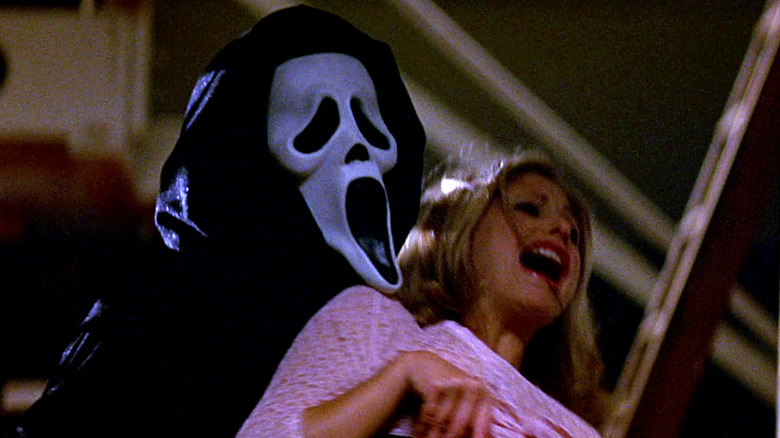
To get the obvious out of the way: yes, if we're being completely honest, the original "Scream" is technically the best film in the franchise. It's got the tightest script, the best opening scene, and probably one of the best-executed killer reveals in the slasher genre. It has a plot that feels meticulously crafted, and it does a tremendous job of balancing the mix of comedic and horror elements that these movies are so famous for.
And yet at the same time, "Scream" feels a little cold, mostly through no fault of its own. There's only a small handful of characters the audience can sympathize with throughout the film, mainly Sidney (Neve Campbell), Drew Barrymore's Casey (who doesn't make it past the first scene), and Sidney's best friend Tatum (Rose McGowan). Nearly everyone else in the movie, however, is a potential murderer, which means the audience is basically forced to hold them at arm's length. Everyone loves the brave-yet-clumsy Dewey (David Arquette) and the horror buff Randy (Jamie Kennedy), but we didn't love them the first time around because the movie was quietly using them as red herrings.
This is the first of many reasons why "Scream 2" is the most emotionally affecting movie of the series. The pacing might be a little off at some points, and the killers might not be on the same level as Billy and Stu, but I know if I was only allowed to rewatch one of these movies for the rest of my life, I'd choose "Scream 2" every single time.
The Deaths Hurt So Much More Here
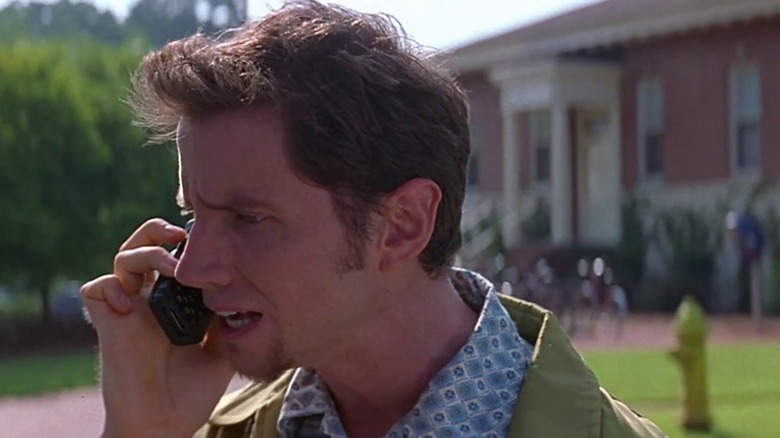
Let's be honest: if Randy had died in the first "Scream," would he have been mourned? He's a great character, sure, and he managed to get some memorable moments within that first film, but did the audience really have time to form any deep attachment to him? The main thing we knew about Randy in the first movie was that he is a horror movie buff (like the killer) and that he has a thing for Sidney (like the killer), which tainted his every action. Even rewatching "Scream," knowing full well that Randy's innocent, there's a barrier to sympathizing with the character because the movie itself is doing such a good job at painting him as a suspect.
"Scream 2" is different. There are no shortage of potential murderers in this movie, but Randy, Dewey, and Gale (Courteney Cox) are never treated suspects. Yes, there are a few conversations in the beginning where Randy tries to raise the idea of Dewey or Gale donning the Ghostface mask this time around, but the movie smartly never takes these ideas seriously. For each of these characters, the audience is now fully on their side from the moment they show up on screen, which means that when Randy gets gutted in broad daylight, it really stings. It's one of the most brutal moments in this series, not just because of the gore, but because of how much the audience has been able to develop a relationship with the character. It's a connection that could've only been formed through sheer familiarity, which the first movie didn't have time to do.
The Scariest Movie In The Series
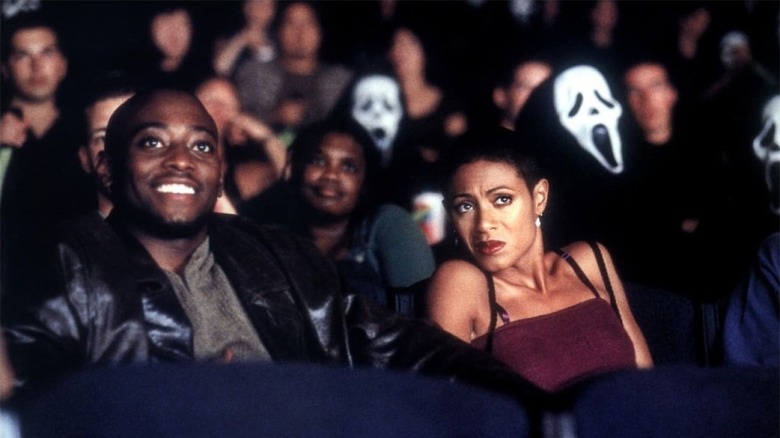
A key rule for horror sequels, as Randy tells us in this movie, is that "the body count is always bigger" and "the death scenes are always much more elaborate -- more blood, more gore."
"Scream 2" easily follows through on this promise from the very first scene. The opening kill in the movie theater is not just scary in its own right, but probably one of the series' most effective use of social commentary. Whereas Casey (Drew Barrymore) dies because she's trapped all alone with the killer, Maureen (Jada Pinkett Smith) is killed in a room full of people who can't distinguish between the actual murder happening in front of them and the murders in the movie.
"Scream 2" also features a suspenseful chase scene with Sarah Michelle Gellar's Cici, the terrifying scene where Sidney has to crawl over an unconscious Ghostface in a crashed police car, and (maybe the most impressive) Gale's chase scene through an empty building. They're not just some of the most inventive, suspenseful chase sequences in the whole series, but they hold extra weight because, again, we've actually been meant to care a lot about all of these characters. (This is why we're particularly excited for "Scream 6," which will have a similar advantage with the new generation of survivors.)
Hiding In Plain Sight
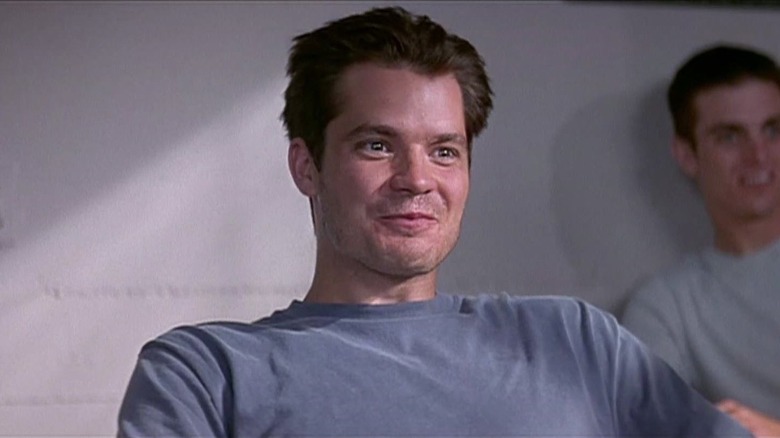
But maybe the creepiest part of this movie is the way the killers, Mickey Altieri (Timothy Olyphant) and Nancy Loomis (Laurie Metcalf), act before the big reveal. Neither of them are major characters until the ending, which might makes their reveals feel slightly anti-climactic on first watch. However, it makes them both so much creepier the second time around. Mickey in particular just seems like a normal guy for most of the film, in a way that Billy nor Stu never did. (No offense to either of those two, but every single thing they did in their movie was a red flag. Or rather, all offense to those two.)
It makes it so much more disturbing to watch Mickey the second time around as he's subtly manipulating Sidney into distrusting her boyfriend. "Why would anyone go back in that house anyway?" he asks, in a scene that puts the focus on Derek (Jerry O'Connell) the first time around. More so than any other movie in this series, ''Scream 2" successfully evokes that terrifying notion that the seemingly-normal person next to you could actually be a cold-blooded killer, and there'd be no way for you to tell until its too late.
It's a feeling that pervades the film, and makes seemingly innocent scenes like Randy's film class debate over sequels seem chilling in retrospect. In that scene, Cici playfully insults Mickey in front of the rest of the class, not knowing that she's basically signed her own death warrant right there.
Sidney's Arc
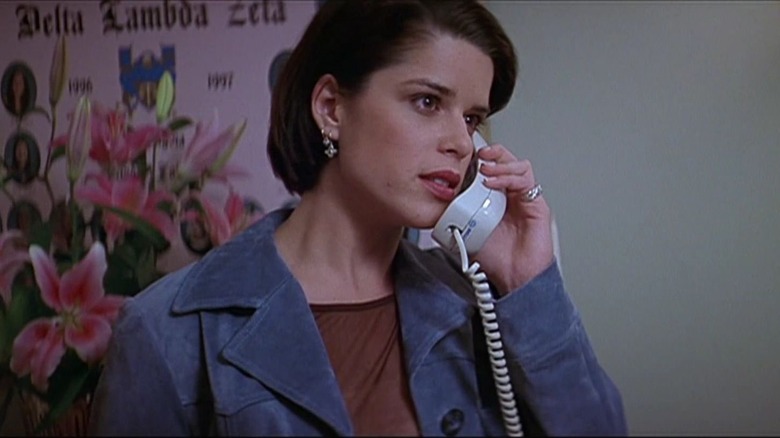
The movie's ability to show how anyone can secretly be a killer only makes Sidney's whole arc all the more effective. You see, Sidney understandably has some trust issues after her first boyfriend turned out to be a murderer, and the killers spend the whole movie torturing her over it. She trusted her boyfriend in the first movie and it was a huge mistake; now every act of love Derek makes towards her is undercut by that sneaking suspicion that he's another Billy Loomis.
More so than the death of her friends again, it's Derek's final words — "I would never hurt you" — that truly break Sidney, and leave her a self-isolated mess at the beginning of the third film. She finally finds a man who really is as good as he says he is, and Mickey engineers a situation where she'll forever feel guilty over his death. It's a moment where the movie takes the expectations behind horror sequels and weaves them into a truly well-acted, well-written character arc for Sidney.
As silly as the "Scream" movies sometimes get, they always portray Sidney's trauma seriously, showcasing her attempts to heal in surprisingly realistic and compelling ways. Even when the later sequels stop focusing on her as much, the writing always seems to jump in quality the moment Sidney shows up on screen. But it's with "Scream 2" that Sidney is at her most compelling, where her attempts to work past her trauma are so seamlessly interwoven with the movie's plot and social commentary. She's trying so hard to rebuild her life after the events of the first movie, and Mickey and Mrs. Loomis tear it all down.
Introducing The Stab Movies
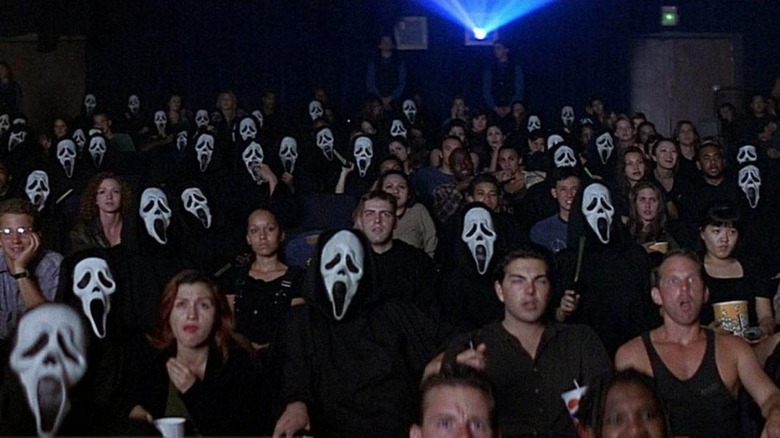
Maybe more than anything, this movie deserves credit for introducing what's arguably the most interesting element of the "Scream" franchise as a whole: the in-universe "Stab" franchise that's inspired by the events of the first film. The original film was critical of the way horror movies can desensitize people to violence, and "Scream 2" takes that to a whole other level.
As critics of the movies and shows like the recent Jeffrey Dahmer Netflix series are painfully aware, there's quite a bit of money to be made in exploiting real life tragedies for mass entertainment. That's exactly what happens here, as the worst week of Sidney's life has now been made into a popular movie, forcing her into quasi-celebrity status over something she'd much rather forget.
This could've easily veered into territory that was too silly or too removed from the main story, but that's not the case here. In fact, the film ties into Gale's whole character arc by having her be the one to write the book the movie is based on. It's something that makes perfect sense for her character, even as it's an exploitative act that makes Sidney's life so much harder.
Fleshing Out Gale
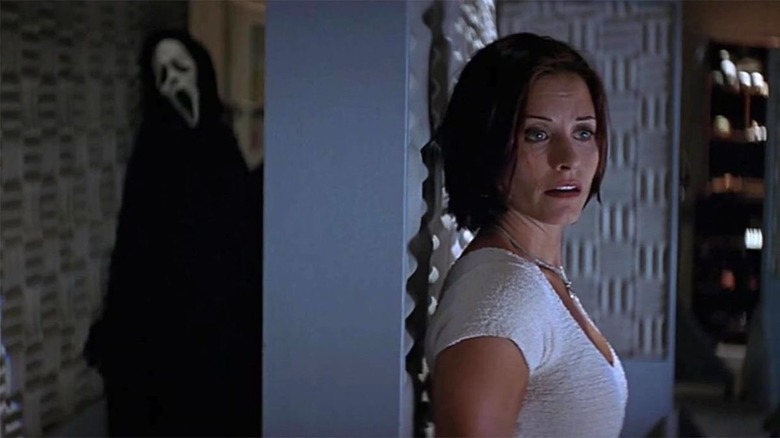
Early on, when Sidney punches Gale like she did in the first movie, it feels like "Scream 2" is doing that classic bad sequel thing of repeating all the same beats from the original. The difference, of course, is that this time around, Gale has a fleshed-out character arc. In the first movie, we learned to like her despite the fact that she's a self-centered, opportunistic reporter. In the second movie, we get to watch as she actually changes.
Randy's death in particular is important not just because of how brutal it is, but because of how it marks the first real shift in Gale's character. In "Scream," Randy was a stranger to Gale, just like all the other killer's victims. But by the time Randy's getting stabbed to death in that van, Gale's gotten to know him. His death is real to her in a way that none of the deaths in the first movie were.
Gale's chase sequence in this movie also isn't just great because of how scary it is; it's great because it's the first time where Gale's been placed directly in Sidney's shoes, experiencing exactly what it's like to have a killer chase after you specifically. Yes, Gale was put in harm's way in the first film, but the killers were treating her as an afterthought the whole way through. They'd have never bothered to chase after her the way Ghostface does here.
"Scream 2" re-introduces Gale as someone who'd happily go straight to reporting about the event the moment the dust's settled, and leaves her as someone who puts all that aside to comfort a wounded Dewey. It's a big change, done in a realistic way, and one that cements Gale as a core character of the series.
Fleshing Out Dewey
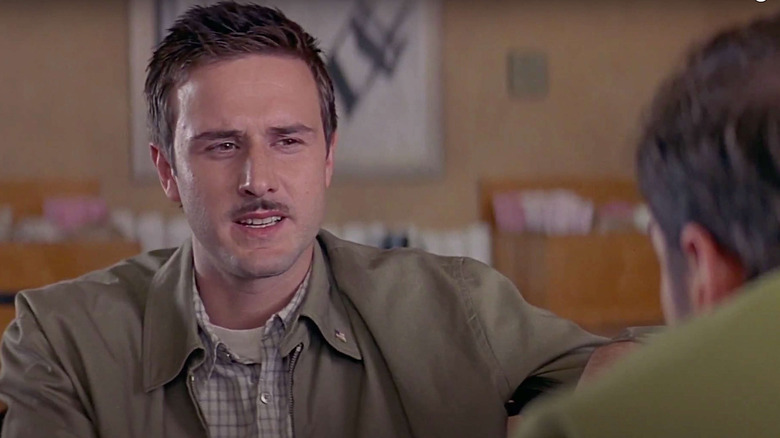
The final member of the series' core trio is Dewey, a character who's longevity is perhaps the most surprising. Like Randy, Dewey doesn't make a particularly great first impression. When he and Gale go on a walk together, "Scream" is actively trying to make us wonder if he's planning to get her alone so he can kill her. But since we know he's not a killer from the start of "Scream 2," the movie can afford to turn him into an actual character.
Like with Sidney punching Gale, it's a common criticism that Dewey and Gale's romance in "Scream 2" feels like repeating the same beats we've seen before. But in the first film, there's really not much of a relationship between the two at all. At first Gale is using him to get closer to the case, and then gradually she starts to develop real feelings for him, but there's nothing there that indicates any sort of lasting relationship can come of it. After all, they barely know each other. It's easy to be smitten with a stranger, but "Scream 2" does the work of making these two a believable couple, even after they've gotten to know each other.
It also does a better job at establishing Dewey's friendship with Sidney. Dewey feels protective over her because she was his sister Tatum's best friend. Tatum's not mentioned much after the first film, but her memory is evoked every time Dewey and Sidney interact. Admittedly, it stretches some credulity that Dewey makes it through those multiple stabbings from the first film in one piece, but letting him live was probably the smartest move over all. By this point, they'd successfully made Dewey into one of the most lovable characters in the series; why throw that away so soon?
It Had No Right Being This Good
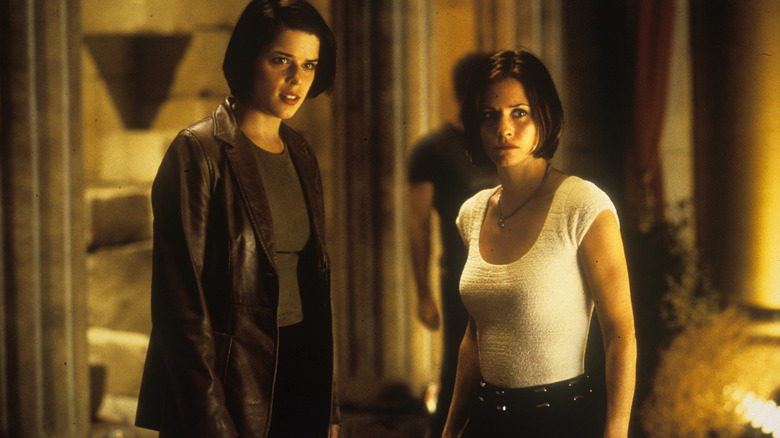
But while most viewers (wrongly) seem to agree that "Scream 2" is not among the ranks of any of those superior sequels mentioned in Randy's film class, we should at least agree that the movie accomplishes nearly everything a sequel is supposed to do. It's a movie that takes the characters from the original in a new, exciting direction without losing sight of what made them fun in the first place. It's a movie that ups the ante, as well as expands on the themes of the original.
The most impressive part of "Scream 2" is that all common sense should've indicated that it wouldn't be good at all. It was a movie whose production was rushed due to the massive success of the first film, where the creative team also now had to worry about scripts leaking on the internet. I supposed it helped that the film itself was aware that most sequels are considered inferior to the original, and it spent a lot of its runtime playing around with common sequel tropes and cliches.
As we wait for "Scream 6," the second installment of this new series of Scream movies, I definitely recommend giving its spiritual predecessor another watch. It still might not be your favorite, but odds are it's much, much better than you remember.
Read this next: The Saddest Character Deaths In Horror History
The post Why Scream 2 is Actually the Best Movie in the Franchise appeared first on /Film.
0 Comments